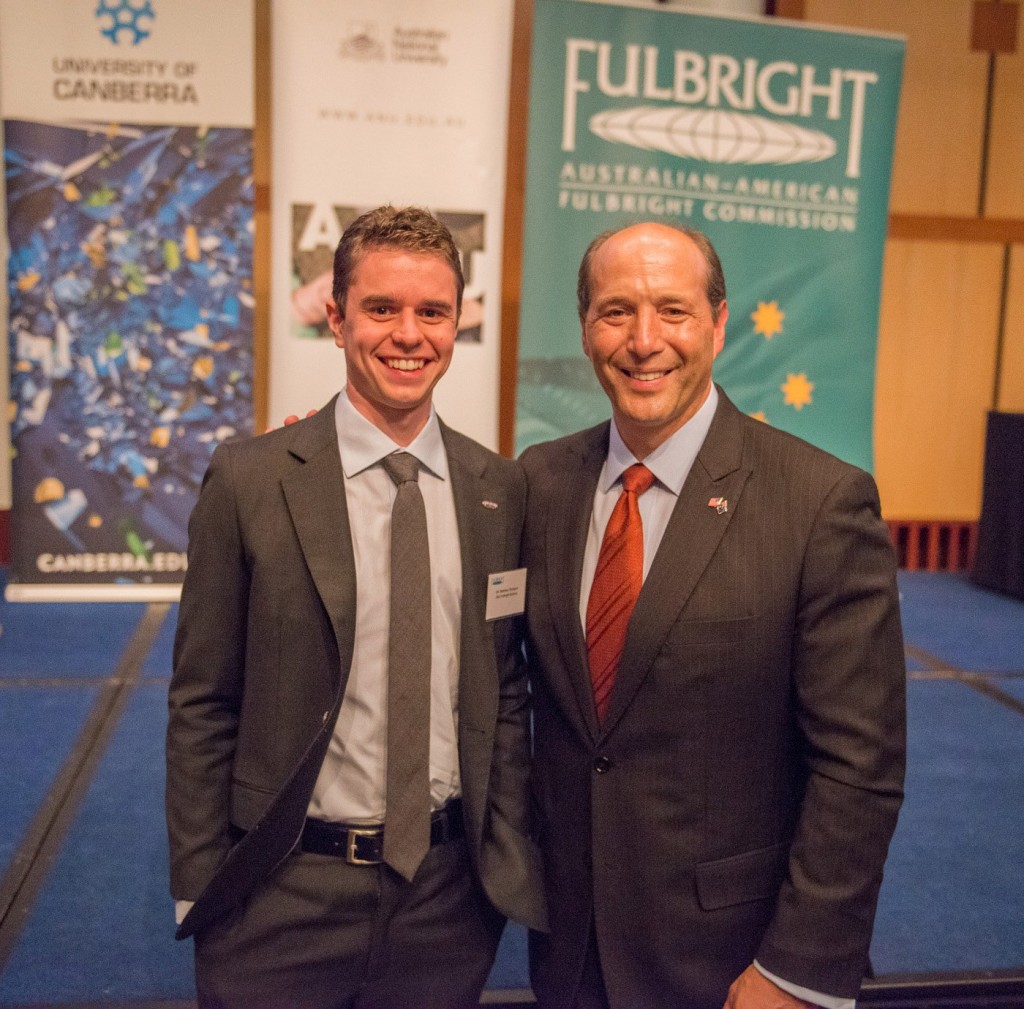
United States Amb. Jeffrey Bleich with Australian Fulbright scholar Matthew B. Thompson at Parliament House, Canberra, April 18, 2013.
Despite the predictable flurry of presidential election cycle side-issues, recent polls confirm that Americans remain focused primarily on two: national security and the economy. The wisdom of this focus on security was confirmed once again by the horrific terrorist attacks in Paris last week. Because some of our greatest threats come not from nations, but from private networks, as do some of our best opportunities, security depends upon looking beyond borders.
This week, in observing International Education Week around the globe, we should be reminded of Senator J. William Fulbright's insight in 1946: the best way to survive the next violent conflict is to make sure that it never happens. A strong economy, a strong defense, a broad set of alliances, and a new set of international laws and standards were part of that strategy. But Fulbright's secret weapon for long-term peace and prosperity was something new: the "soft" power of educational exchange. That vision gave rise to the Fulbright Program.
Senator Fulbright understood that there is no better antidote to ignorance and hostility than mutual understanding and friendship. As a former U.S. Ambassador to a key ally, and now on the Board that supervises Fulbright's global program, I have seen firsthand how educational exchanges serve broader values that keep us safe and strengthen our economy in the long term. They are not just an adjunct to traditional education; they are part of our national interest.
The reason we have embassies around the world is that diplomacy requires more than reading and watching images - it requires experiencing firsthand other nations' politics, culture, economy, social customs, media, and how they interpret events. Fulbright grant recipients are opinion-leaders in their communities across a range of fields in every part of the world. Because of Fulbright, future judges, scientists, Prime Ministers, artists, University deans, business leaders have had their views informed by international experience. Fulbrighters have a better understanding not only of their host country, but also a deeper appreciation of their own country. Fulbright, over seven decades, has built this capacity in 180 countries, helping increase understanding among 360,000 alumni, including 33 current or former heads of state or government.
The most turbulent areas in the world today are those that have resisted ethnic, racial, and religious diversity. In a globalized world, the difference between collaboration and friction can turn on subtle things - mannerisms, phrasing, superstitions, or beliefs. Exchanges train leaders to avoid miscommunications, to deal with diverse perspectives, to abide unfamiliar habits, and to gain critical insights into different cultures and traditions. At the same time, the Fulbright Program introduces other nations to the breathtaking diversity of American society. As the Fulbright Program draws the best and brightest from underserved communities, rural areas, minority-serving institutions and community colleges, it dispels anti-American stereotypes and prejudices.
The cornerstone of U.S. influence and resilience has always been our economy, which gives us the capacity to engage around the world. As a purely practical matter, international students bring in more than $30 billion to the U.S. economy each year. At the same time, World Bank economists estimate that for every year of university study, individual income for students increases by 10 to 15 percent. More importantly, future business leadership requires having international education experience. Success, for our next generation of economic leaders, will depend on the ability to navigate a global marketplace. Educational exchange experiences broaden business networks, improve cross-cultural and language skills, increase American competitiveness and boost career opportunities.
Language doesn't only express our thoughts; it shapes them. When we learn a new language, we discover words exist for ideas that, until then, had gone unformed in our minds. This is essential to breaking down barriers, and avoiding miscommunication and conflicts. American Fulbrighters gain deep insights about other cultures and form lifelong bonds by learning and speaking those languages within those cultures. Within our own borders, the Fulbright Program has brought critical access to teaching assistants who are training Americans in 30 languages. Fulbright is also leading the response to a worldwide demand for English, as English represents a gateway to information, education and job opportunities. The Fulbright English Teaching Assistant Program operates in 70 countries, placing 1,000 recent U.S. college graduates in host country primary and secondary schools and universities.
Most people in the world will never meet a U.S. service member, aid worker, or diplomat. Their sense of actual Americans and American values comes from business people, students, and other travelers. The same is true for us - our best chance to understand the people of other nations is to bring their future leaders to our shores. Exchanges put all of our best ambassadors forward and - by doing so - help secure our future.